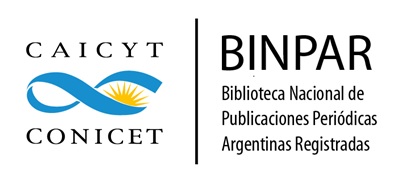«¿Los colegas gateros somos inmorales?»
Masculinidades interpeladas en los relatos de varones que pagan por sexo
DOI:
https://doi.org/10.24215/24690333e046Palabras clave:
sexo comercial, clientes, masculinidades, trata de mujeresResumen
En el trabajo se abordan las reacciones de varones que pagan por sexo y se reconocen como «gateros» o clientes habituales, ante las interpelaciones hacia sus sexualidades y sus masculinidades, y se analizan sus representaciones sobre el sexo comercial, la trata de mujeres y las políticas orientadas a combatirla. En especial, desde el despliegue de la campaña anti-trata, en 2008, y la masificación feminista, en 2015, que volvieron a la práctica de pagar por sexo problemática en un sentido novedoso a partir de su asociación con la violencia de género.
Descargas
Citas
Álvarez Gandolfi, F. (2016). Problemáticas en torno de las ciberculturas. Una reflexión sobre las posibilidades y los límites de la etnografía virtual. Revista de Estudios Culturales de la Universitat Jaume I, (16), 7-20. http://dx.doi.org/10.6035/clr.2016.16.1
Andrijasevic, R. (2007). Beautiful dead bodies: gender, migration and representation in anti-trafficking campaigns. Feminist Review, 86(1), 24-44. https://doi.org/10.1057/palgrave.fr.9400355
Bernstein, E. (2001). The Meaning of the Purchase: Desire, Demand and the Commerce of Sex. Ethnography, 2(3), 389-420.
Birch, P., Baldry, E. and Hartley, V. H. (2017). Procuring Sexual Services: Evidencing Masculinity Diversity and Difference Through Sex Work Research. Sexuality & Culture, 21(4), 1106-1119. https://doi.org/10.1007/s12119-017-9439-5
Carabajal, M. (27 de mayo de 2013). «El varón paga para humillar a la mujer» [Entrevista a Juan Carlos Volnovich]. Página/12. Recuperado de https://www.pagina12.com.ar/diario/sociedad/3-20888-2013-05-27.html
Chejter, S. (2010). Lugar común: la prostitución. Ciudad Autónoma de Buenos Aires, Argentina: Eudeba.
Connell, R. W. (1987). Gender and power. Sydney, Australia: Allen and Unwin.
Connell, R. W. y Messerschmidt, J. (2013). Masculinidade hegemônica: repensando o conceito. Estudos Feministas, 21(1), 241-282. https://doi.org/10.1590/S0104-026X2013000100014
Corso, C. (2004). Desde dentro: los clientes vistos por una prostituta. En R. Osborne (Ed.), Trabajador@s del sexo. Derechos, migraciones
y tráfico en el siglo XXI (pp. 121-131). Barcelona, España: Bellaterra.
Das Biaggio, N., Vallejos, A., Lenarduzzi, Z. y Firpo, I. (2008). Las relaciones de género en la prostitución: construcción social de nuevas subjetividades. Concepción del Uruguay, Argentina: Universidad Nacional de Entre Ríos.
Doezema, J. (2000). Loose Women or Lost Women. The ReEmergence of the Myth of «White Slavery» in Contemporary Discourses of «Trafficking in Women». Gender Issues, 18(1), 23-50. Recuperado de http://www.walnet.org/csis/papers/doezema-loose.html
Fassin, E. (2012). La democracia sexual y el choque de civilizaciones (Trad. de Milagros Belgrano Rawson). Mora, 18(1). http://revistascientificas.filo.uba.ar/index.php/mora/article/view/322
Farley, M., Macleod, J., Anderson, L. and Golding, J. M. (2011). Attitudes and Social Characteristics of Men Who Buy Sex in Scotland. Psychological Trauma, 3(4), 369-383. https://psycnet.apa.org/doi/10.1037/a0022645
Fuller, N. (2012). Repensando el machismo latinoamericano. Masculinities & Social Change, 1(2), 114-133. https://doi.org/10.4471/mcs.2012.08
Galindo, M. y Sánchez, S. (2007). Ninguna mujer nace para puta. Ciudad Autónoma de Buenos Aires, Argentina: Lavaca Editora.
Gómez San Luis, A. H. y Avendaño, A. M. (2015). Clientes de prostitución: representaciones sociales de trata de persona. Psicologia & Sociedade, 27(2), 280-289. https://doi.org/10.1590/1807-03102015v27n2p280
Gorjup, M. T. y Baltar, F. (2012). Muestreo mixto online: una aplicación en poblaciones ocultas. Intangible Capital, 8(1), 123-149. Recuperado de https://www.redalyc.org/articulo.oa?id=54924517006
Gusfield, J. R. (2014). La cultura de los problemas públicos. El mito del conductor alcoholizado versus la sociedad inocente. Ciudad Autónoma de Buenos Aires, Argentina: Siglo XXI.
Guy, D. J. (1994). El sexo peligroso. La prostitución legal en Buenos Aires 1875-1995. Ciudad Autónoma de Buenos Aires, Argentina: Sudamericana.
Hine, C. (2015). Ethnography for the Internet: Embedded, Embodied and Everyday. London, United Kingdom: Bloomsbury Academic.
Illouz, E. (2014). Erotismo de autoayuda. Cincuenta sombras de Grey y el nuevo orden romántico. Ciudad Autónoma de Buenos Aires, Argentina: Katz.
Kaufman, M. (1995). Los hombres, el feminismo y las experiencias contradictorias del poder entre los hombres. En L. G. Arango, M. León y M. Viveros (Comps.), Género e identidad. Ensayos sobre lo femenino y lo masculino (pp. 123-146). Bogotá, Colombia: Tercer Mundo. Recuperado de https://goo.gl/YY5Ra8
Kulick, D. (2005). Four Hundred Thousand Swedish Perverts. GLQ: A Journal of Lesbian and Gay Studies, 11(2), 205-235. https://doi.org/10.1215/10642684-11-2-205
Martynowskyj, E. (2018). De clientes a varones prostituyentes. Una aproximación al proceso de construcción de un sujeto «repudiable». RevIISE. Revista De Ciencias Sociales Y Humanas, 12(12), 27-36. Recuperado de http://www.ojs.unsj.edu.ar/index.php/reviise/article/view/261
Martynowskyj, E. (2019). «Estoy acusada de víctima de trata». Tensiones en el diálogo entre verdades jurídicas y sociales en el despliegue de políticas anti-trata. Sudamérica: Revista de Ciencias Sociales, (11), 68-97. Recuperado de https://fh.mdp.edu.ar/revistas/index.php/sudamerica/article/view/3847
Meneses, C., Uroz, J. and Rua, A. (2018). Can Clients Who Pay for Sexual Services Help Victims of Sex Trafficking? Masculinities and Social Change, 7(2), 178-208. https://doi.org/10.17583/mcs.2018.3173
Monto, M. A. y Milrod, C. (2014). Ordinary or Peculiar Men? Comparing the Customers of Prostitutes with a Nationally Representative Sample of Men. International Journal of Offender Therapy and Comparative Criminology, 58(7), 802-820. https://doi.org/10.1177/0306624X13480487
Morcillo, S., Martynowskyj, E. y de Stéfano Barbero, M. (2018). Una aproximación a los discursos sobre feminismo en varones que pagan por sexo en Argentina. Sapiens Research, 8(2), 54-62. Recuperado de https://www.srg.com.co/bcsr/index.php/bcsr/article/view/291
Morcillo, S., Martynowskyj, E. y de Stéfano Barbero, M. (2020a). “Negros, mafiosos y ortivas”. Masculinidades y proxenetas en los relatos de varones que pagan por sexo en Argentina. Cuestiones de Sociología, (23), e102. https://doi.org/10.24215/23468904e102
Morcillo, S., Martynowskyj, E. y de Stéfano Barbero, M. (2020b). Aprendiendo a “gatear”: masculinidades y carreras morales en varones que pagan por sexo en Argentina. Aposta: revista de ciencias sociales, (86). Recuperado de http://apostadigital.com/revistav3/hemeroteca/smorcillo.pdf
Morcillo, S., Martynowskyj, E. y de Stéfano Barbero, M. (2021a). “Lo importante no es ponerla, sino sacarla sana y a tiempo”. Masculinidad y salud entre varones que pagan por sexo en Argentina. Papeles de Trabajo del IDAES-UNSAM, (25).
Morcillo, S., Martynowskyj, E. y de Stéfano Barbero, M. (2021b). ¿El macho «apichonado»? Masculinidad, emociones y relaciones de género en los relatos de varones que pagan por sexo en Argentina. Contemporânea. Revista de Sociologia da UFSCar, 11(3). https://doi.org/10.4322/2316-1329.2021007
O´Connell Davidson, J. (1998). Prostitution, Power and Freedom. Cambridge, United Kingdom: Polity Press.
O´Connell Davidson, J. (2006). Will the Real Sex Slave Please Stand up? Feminist Review, (83), 4-22.
Olavarría, J. (2003). Los estudios sobre masculinidades en América Latina. Un punto de vista. Anuario Social y Político de América Latina y el Caribe, (6), 91-98.
Pereyra, S. (2018). La estabilización de un problema público: la corrupción en la Argentina contemporánea. En J. C. Guerrero, A. Márquez G. Nardacchione y S. Pereyra (Coords.), Problemas públicos: aportes y controversias contemporáneas (pp. 122-174). Ciudad de México, México: Instituto Mora.
Ranea Trivino, B. (2016). Analizando la demanda: relación entre masculinidad hegemónica y prostitución femenina. Investigaciones
Feministas, 7(2), 313-330. https://doi.org/10.5209/rev_INFE.2016.v7.n1.50746
Rostagnol, S. (2011). Consumidores de sexo. Un estudio sobre masculinidad y explotación sexual comercial en Montevideo y área metropolitana. Montevideo, Uruguay: RUDA.
Rubin, G. (1989). Reflexionando sobre el sexo: notas para una teoría radical de la sexualidad. En C. Vance (Comp.), Placer y peligro. Explorando la sexualidad femenina (pp. 113-190). Madrid, España: Revolución.
Sanders, T. (2008). Paying for Pleasure: Men Who Buy Sex. Toronto, Canada: Willan Publishing.
Simonetto, P. (2019). El dinero no es todo: compra y venta de sexo en la Argentina del siglo XXI. Ciudad Autónoma de Buenos Aires, Argentina: Biblos.
Skeggs, B. (2019). Mujeres respetables. Los Polvorines, Argentina: Universidad Nacional de General Sarmiento.
Varela, C. (2013). De la “letra de la ley” a la labor interpretante: la “vulnerabilidad” femenina en los procesos de judicialización de la ley de trata de personas (2008-2011). Cadernos Pagu, (41), 256-302. https://doi.org/10.1590/S0104-83332013000200015
Vacarezza, N. L. y Sánchez, A. (2010). Apuntes para una crítica de la producción sociodiscursiva de masculinidad consumidora y de varones demandantes de prostitución. Question, 1(27). Recuperado de https://perio.unlp.edu.ar/ojs/index.php/question/article/view/1035
Volnovich, J. C. (2010). Ir de putas: reflexiones acerca de los clientes de la prostitución. Ciudad Autónoma de Buenos Aires, Argentina: Topía Editorial.
Archivos adicionales
Publicado
Cómo citar
Número
Sección
Licencia
Derechos de autor 2022 Estefania Martynowskyj

Esta obra está bajo una licencia internacional Creative Commons Atribución-NoComercial-CompartirIgual 4.0.
Del número 1 (2015) al número 3 (2017) los materiales se publicaron bajo una licencia BY-NC-ND.
A partir del número 4 (2018), los materiales se publican bajo una licencia BY-NC-SA.
Acorde a estos términos, el material se puede compartir (copiar y redistribuir en cualquier medio o formato) y adaptar (remezclar, transformar y crear a partir del material otra obra), siempre que a) se cite la autoría y la fuente original de su publicación (revista y URL de la obra), b) no se use para fines comerciales y c) se mantengan los mismos términos de la licencia.








.jpg)

.png)



.png)























